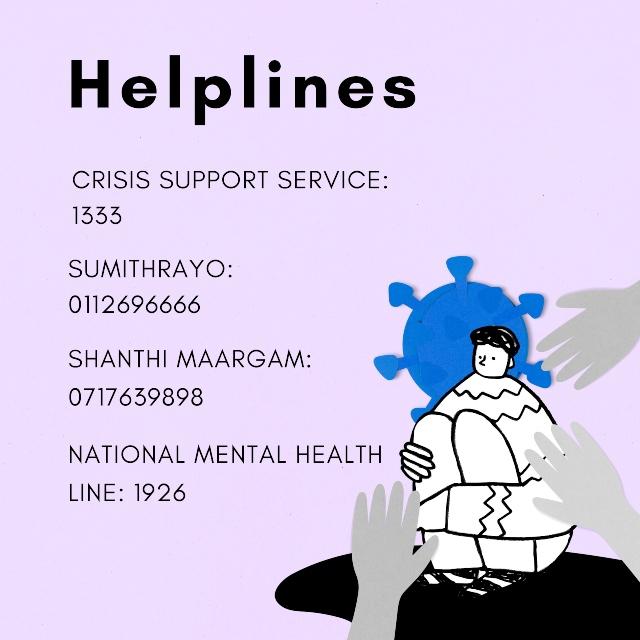25 Apr 2020 - {{hitsCtrl.values.hits}}
By Kalani Kumarasinghe
With 47 coronavirus cases identified within a day, and another renewed curfew, these grim times take great effort to stay positive and keep our worries at bay. But why do we worry and how can we cope? We asked Counselling Psychologist Nivendra Uduman to help us gain some clarity.
Why is the curfew so stressful?
The COVID-19 outbreak is something we were not prepared for as a country and had not even dreamt of, so adjusting to a new reality which includes an extended curfew is naturally very difficult for most people. People may experience feelings of being restricted, trapped, and a general feeling of powerlessness that is making this period stressful for people in Sri Lanka. There are also anxieties around finances, education etc. which is also very stressful.
Another reason the curfew can be stressful is because there has been a change in roles people play in their lives, and also a possible change in power dynamics at home. For example, a male who was always out at work is now at home for a long period of time, and that can have a significant impact on his well-being, but can also affect the well-being of others at home, as he might have difficulty accepting his new reality. Not everyone is privileged to live in comfortable, spacious homes, so for some people being cramped up in a small space with a large family, not having privacy and feeling like one’s boundaries are constantly violated, can be frustrating.
People react and respond differently to a crisis. Feeling stressed, forgetful or experiencing sleep problems and difficulties with appetite are all common reactions when we are in a process of adjusting to change, within a short period of time. Every person will have a different reaction.
I think it is very normal to feel like one’s had enough, when it comes to spending time with the same people for a long time. There has been a narrative around ‘make the maximum time you have with your family’ that has been going around since the outbreak, and it is important that we acknowledge that not every home is a safe place, and not every family is fully functional.
There are things that are bound to irritate us about other family members, and other family members would also find themselves irritated with us, as it is a very stressful time for everyone. So, asking for space from other family members, taking a break where you can be by yourself for a while (if that is possible), and finding ways to relax can be ways to cope with the feeling of ‘ I’ve had enough’. Engaging in something like a creative medium, reading, physical activity, even gardening can help regulate difficult emotions we might feel at this time.
Another important step is to identify your own warning signs when you know that tension is rising, and to be able to take a step back and deescalate that tension. Emergency tips on deescalating tension in relationships at home involve, moving away from the immediate environment for a few minutes, splashing cold water on one’s face and back of the neck, practicing deep breathing, speaking to someone you trust about what you are feeling etc.
Worries around supplies is very normal, and anxiety would cause some people to keep stocking up on essential items. The thought around ‘not having enough’ is what can drive this sort of behaviour. Some people also tend to catastrophise believing that the worst may happen.
Thinking about what you can control and what you cannot control is one way to cope with worries about the future. We essentially do not have much control over the future, but we can still do some contingency planning around how we can survive. Speaking to other people about one’s worries can be helpful, and writing them down can also be a way of coping. I would also say, acknowledging worrying thoughts that we have instead of suppressing or avoiding them can help make coping easier for us.
Repeated exposure to distressing news obviously would make us anxious and distressed. Having time slots in one’s day where news can be viewed is a way to manage anxieties around news.
Productivity is a very relative thing. Yes, there is a pressure to be productive and to be the best version of yourself during this time, and social media tends to propagate that, especially when we see what our friends and family members are doing. There is a tendency to engage in social comparison where we compare ourselves with others, we see on social media without really knowing their internal reality. It is okay not to be productive if one does not feel like it, while of course engaging in healthy coping strategies like eating and sleeping well. On the other hand, if one feels like being productive, working, or engaging in something else, that is also okay. There is no golden rule about productivity during a crisis of this nature.
I would really encourage them to seek professional help during this time. There are mental health professionals who provide services online and we also have telephone helplines people can reach out to. If one is already on medication, it is important that medication is continued during this time. People can contact their local hospital or channel a doctor on an APP like O-Doc where prescriptions can be filled. Engage in your normal self-care routine as much as possible.

06 Jan 2025 34 minute ago
06 Jan 2025 1 hours ago
06 Jan 2025 1 hours ago
06 Jan 2025 1 hours ago
06 Jan 2025 2 hours ago